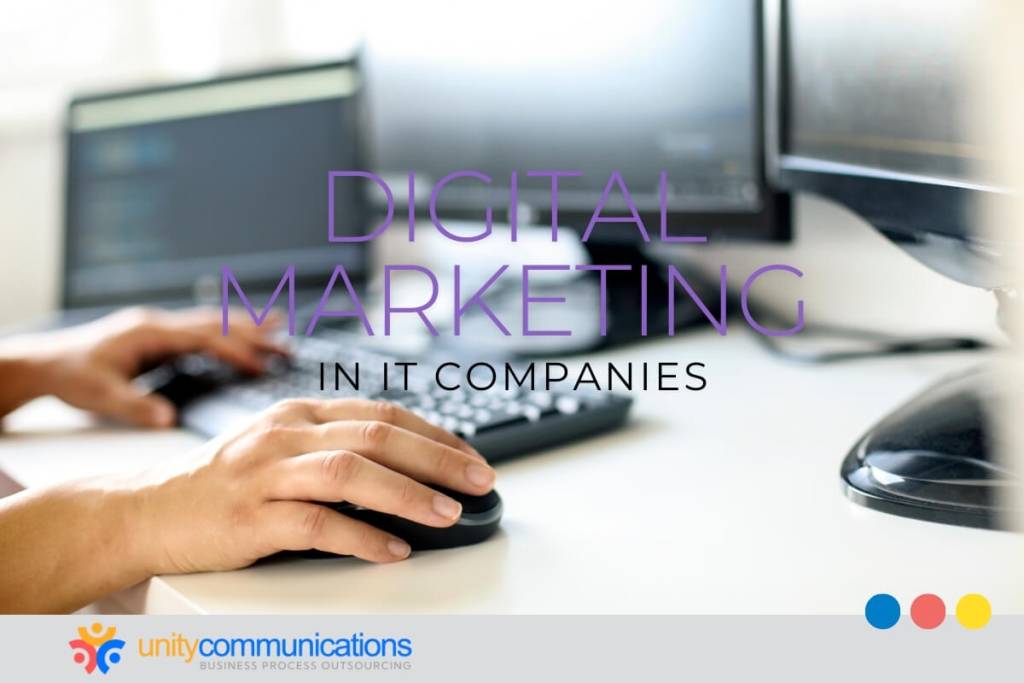Table of Contents
Digital marketing is critical for acquiring customers for information technology (IT) companies. Targeted methods can help reach audiences more effectively, increasing leads and conversions.
This article explores how digital marketing services can help IT firms increase their internet presence and seize new prospects. Continue reading to learn actionable insights for your lead-generation efforts!
Understanding and building a digital marketing strategy for IT firms

Digital marketing helps IT companies stay competitive, broaden their audience, and connect with potential customers. A solid, targeted strategy is key to effectiveness and success.
Building a strategy entails knowing your services, whether cloud computing, cybersecurity, or IT consulting, and picking the most effective channels, including search engine optimization (SEO), pay-per-click (PPC), or social media.
Identifying the right audience through analyzing needs, challenges, and behaviors helps your IT firm form targeted campaigns. Focusing on industries that need technical expertise maximizes the impact of your marketing efforts, attracting potential clients and increasing brand visibility and relevance in an evolving market.
Leveraging content marketing to showcase technical expertise
Content marketing builds a reputation for your organization. You can demonstrate competence and establish yourself as an industry leader by delivering valuable, insightful materials that tackle audiences’ pain points. Effective formats include:
- Whitepapers: Detailed reports offer actionable insights, solutions, and industry knowledge to resolve specific issues and challenges.
- Case studies: Real-life examples showcase how the company successfully addresses client problems, providing credibility and proof of expertise.
- Webinars: Interactive sessions engage potential clients, allow the company to show its proficiency, and connect with a broader audience.
- Blog posts: Regular articles share industry insights, meet common client concerns, and provide practical solutions to typical problems in the IT industry.
- Thought leadership articles: The content positions your organization as a trusted authority, providing in-depth analysis and helpful perspectives on industry trends and developments.
Utilizing SEO to Increase Online Visibility
Improving online visibility is a must for your business to attract more leads and customers. Solid digital marketing strategies enable IT companies to build stronger connections with potential clients and drive website traffic and revenue growth.
Effective SEO starts with identifying relevant keywords for IT services based on terms potential clients search for. Key considerations include:
- Industry-specific terms: Focus on cloud computing, cybersecurity, or IT consulting phrases.
- Long-tail keywords: Incorporate detailed search inquiries to target niche audiences.
Improving website performance and accessibility for users and search engines is also necessary. Vital technical SEO tactics include:
- Optimizing site speed: Faster websites offer better user experiences and rank higher on search engines.
- Improving mobile-friendliness: A responsive design caters to the rising number of mobile users.
- Fixing broken links: Updating links enhances site navigation and user satisfaction.
Implementing PPC campaigns for lead generation

PPC campaigns drive immediate traffic and generate leads by connecting your business with customers or organizations seeking specific solutions. Paid ads position your services before the right audience at the right time.
This method complements broader digital marketing strategies by delivering measurable results quickly and better return on investment (ROI). PPC campaigns are beneficial for IT companies by offering:
- Precise targeting: Target users by placements, keywords, demographics, location, or behaviors to attract enterprises seeking IT services.
- Budget control: Adjust campaigns with flexible budgets to match goals and control spending.
- Immediate visibility: Achieve top search engine placement, increasing exposure to key decision-makers.
To reach optimal results, use these tips:
- Keyword selection: Target industry-specific terms relevant to clients.
- Ad copy design: Write solution-focused ads addressing pain points.
- Landing page design: Direct traffic to high-converting pages.
- Performance tracking: Analysis of click-through and conversion rates.
Engaging potential clients through social media platforms
Social media platforms let your enterprise interact directly with potential clients to build brand awareness and relationships. To engage effectively, determine first the best platforms for your target audience.
IT companies typically use LinkedIn, Twitter, and Facebook to connect with professionals and decision-makers seeking industry insights and external expertise.
Next, generate relevant content tailored to the platform. This includes:
- Industry news and updates: Share trending topics to establish authority.
- Client testimonials: Highlight success stories to build trust.
- Interactive posts: Engage with potential clients through polls and discussions.
Active participation in online communities strengthens credibility. Answering questions and addressing concerns on social media positions you as a reliable expert. Regularly track your social media engagement to maximize strategies, refine messaging, and increase interaction.
Nurturing leads with targeted email marketing campaigns
Email marketing nurtures leads and builds relationships with clients. It engages prospects over time, guiding them toward conversion. This digital marketing strategy is vital for IT companies, where personalized content connects with clients seeking tailored solutions.
To craft a successful email campaign, consider the following:
- Segmentation: Organize leads based on industry, needs, or behaviors to deliver tailored content.
- Personalized emails: Use recipient names and provide relevant content based on their interests, preferences, challenges, and pain points.
- Clear calls to action (CTAs): Include actionable steps that prompt recipients to take the next step, such as scheduling a demo or downloading a resource.
- Follow-up sequences: Build trust by sending emails and nurturing leads through educational content, client testimonials, and case studies.
- A/B testing: Experiment with subject lines, email formats, and messaging to identify what best suits your audience.
Measuring the success of digital marketing efforts

Tracking various metrics that reflect your strategy’s performance is essential to gauge the impact of your digital marketing efforts. Watching them closely gives you valuable insights into what’s working and needs improvement.
Key performance indicators (KPIs) for digital marketing should include:
- Website traffic: Track the number of visitors and sources to assess your marketing campaign reach.
- Lead generation: Check how many qualified leads your campaigns generate.
- Conversion rate: Measure the number of leads who become paying clients.
- Engagement: Review social media interactions, email responses, and comments to quantify audience interest.
- ROI: Analyze the profitability of marketing efforts by comparing revenue versus spending.
- Customer retention rate: Track how many clients remain loyal to learn campaign effectiveness.
- Brand awareness: Measure changes in recognition or recall through surveys or mentions to understand campaign visibility.
Exploring future trends in digital marketing for IT companies
To remain competitive, you must stay ahead of emerging trends. Adapting to new developments allows your firm to better engage potential clients and maximize your online presence.
Several trends in digital marketing will shape the strategies of IT companies, such as:
- Artificial intelligence (AI): Automated and AI-powered tools will further streamline marketing processes to improve personalization and customer engagement.
- Voice search optimization: Voice assistants will optimize content for voice search to reach more potential clients and untapped markets.
- Video marketing: Video content will remain popular. IT firms will harness video for tutorials, client success stories, and product demonstrations.
- Influencer marketing: Working with industry influencers will help IT establishments strengthen credibility and tap a broader audience.
- Data-driven decisions: Analyzing big data will allow for more accurate targeting, helping you fine-tune strategies and develop more effective campaigns.
Outsourcing digital marketing to boost lead generation
Business process outsourcing (BPO) is a tried-and-tested strategy when you want your IT company to boost lead generation. What is BPO? The approach involves delegating non-core tasks, such as digital marketing, to third-party experts that can deliver measurable results.
By outsourcing digital marketing management, you can leverage specialized services to expand reach, attract high-quality leads, and maximize campaign effectiveness. This cost-effective business practice saves resources and gives your team access to the latest tools, technologies, and industry expertise.
Understanding how outsourcing works helps clarify its benefits. With BPO, you gain support from skilled and experienced professionals adept at handling different aspects of digital marketing for IT companies. This collaboration fosters scalability and lets your in-house teams focus on core business operations.
Outsourcing in digital marketing offers various services tailored to your business, including:
- Website traffic: Monitor visitors and identify sources, such as organic search, paid ads, and referrals. This reveals your campaign’s reach and highlights effective channels.
- Lead generation: Evaluate the volume and quality of leads, focusing on those aligned with your target audience for better conversion potential.
- Conversion rate: Measure the percentage of leads becoming clients. High rates indicate optimized campaigns that resonate with your audience.
- Engagement: Track interactions such as shares, comments, and responses. Strong engagement shows interest and connection with your audience.
- ROI: Compare campaign costs to revenue generated. A positive ROI indicates a profitable marketing investment and effective campaigns.
- Customer retention rate: Track loyal clients over time. Retention reflects satisfaction and the ongoing value of your campaigns.
- Brand awareness: Use surveys or analyze mentions to assess changes in recognition. Greater visibility enhances market presence.
- Campaign performance trends: Analyze historical data to uncover patterns and improve future strategies.
The bottom line

Looking to turn your digital marketing processes into a lead-generating powerhouse? With the appropriate strategies, you can drive quality leads, engage key decision-makers, and convert prospects into loyal clients.
Let’s connect and discuss how our experience and knowledge in digital marketing for IT companies can help you prosper by boosting online visibility, increasing sales conversions, and building long-term relationships. We can elevate your digital marketing efforts and achieve long-term growth!




